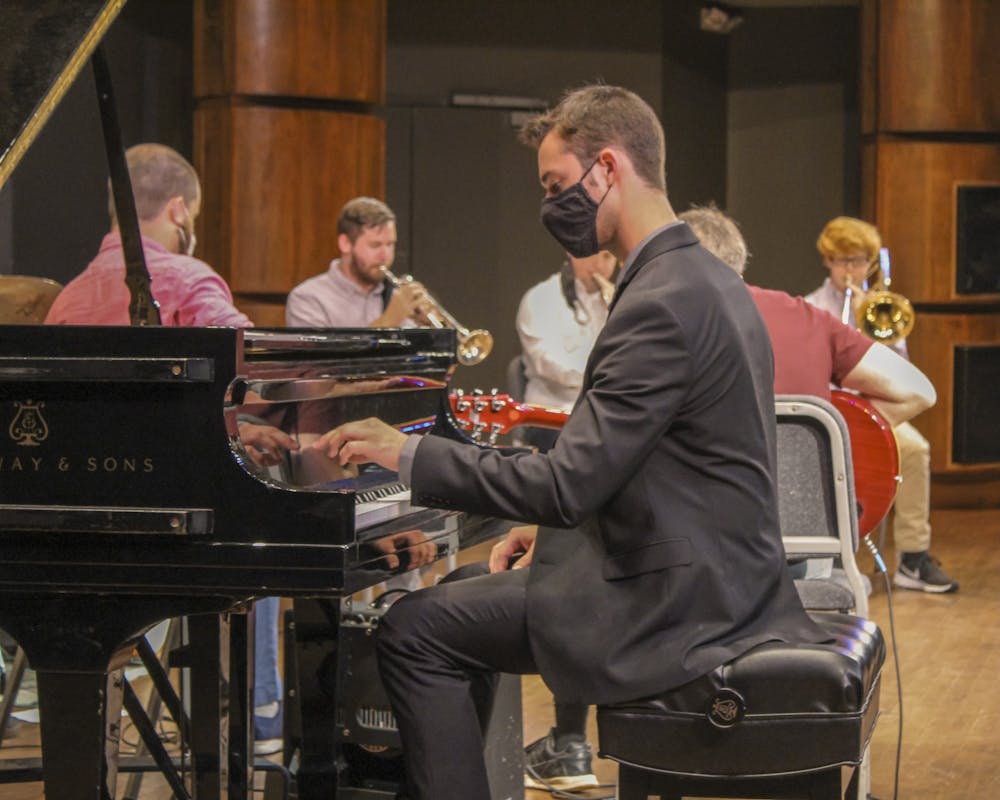Artfulness, glory, and prestige: a jazz student’s aspirations with a less than ideal or knowledgeable crowd.
Jazz in Columbia and UofSC’s campus can feel like a hidden community behind the emphasis on Business and other UofSC schools, however behind the Music school’s doors are not just classrooms and recital halls occupied by not only students fulfilling a music appreciation credit, but passionate artists fulfilling meaning in their medium as well.
When you ask a high school jazz student their top choices for university, it is uncommon or rare to find enthusiasm for a state or “football” school. These students will commonly mention “Berklee” or “UNT” (University of North Texas), or even the University of Miami, and rightfully so. The programs from each of these schools have enriched communities of passionate people, but the same can be said for UofSC. However, like anything on a campus of over thirty thousand students, you just have to look for it.
UofSC’s school of music and jazz program has a plethora of talented staff and students. Among staff, Bert Ligon comes to mind. Although now settling into retirement, Bert is still instructing students periodically in the school of music and even high school students; Morgan Mcgee, a senior jazz studies student, being one of them.
“You have to find your own corner of a giant pond,” McGee said in reference to finding enthusiasm for the arts at UofSC. We discussed how there is a difference in enthusiasm for the arts as there is for sports on campus, but like many things here, it takes some digging to find your passion reciprocated - your own corner.
McGee comes from a prestigious background of the South Carolina Governor’s School for Arts and Humanities, a small boarding art school in Greenville. In discussing his background, McGee recollects on aspirations for Miami, but ultimately decided on UofSC because of its staff. Particularly, Ligon and his teaching style.
Being able to break down aspects of music into concepts applicable to all aspects of music was how McGee became hooked on Ligon’s style of teaching. McGee described Ligon as incredibly logical and an inspiration to McGee’s music making and how he wants to teach. McGee even tries to emulate Ligon’s logical approach to music in teaching his own students.
Our conversation detracted to other schools, from inapplicable rivalries against Clemson or Furman to urban legends about other jazz programs, we talked about how different competition can be in the arts. McGee mentions a lack of competition against Furman or Clemson, and even hints a desire for competition in other schools.
We were able to relate it back to his time in high school, how his alma mater and another arts school in Greenville, the Fine Arts Center, have a rivalry. Although comical in nature there is a refreshing sense of school spirit added to having a rival program. Clemson’s lack of a jazz studies major, or greater selection in majors creates a vacuum in UofSC’s association with other music programs. If there is one way to enliven UofSC students is to hate Clemson, and without that passion in the school of music there is less pep for the school’s events.
Of course, it is not all melancholy. Speaking to McGee, it was hard to detect any dissatisfaction for his school choice. McGee described preparing for a concert in the shadow of the COVID-19 pandemic. An uneasiness of what his audience may look like, only to reveal a packed house, of not only UofSC students, but people outside the school.
For the school of music, there is no need for prestige, a student section, or a rivalry because there is already a faculty and body of passionate folks working tirelessly in their art, and the passing-on of a similar invigoration.



